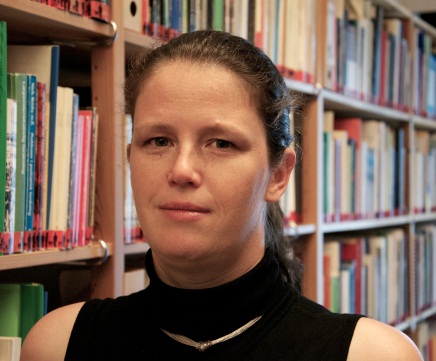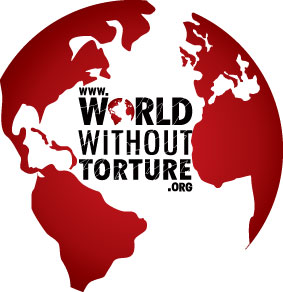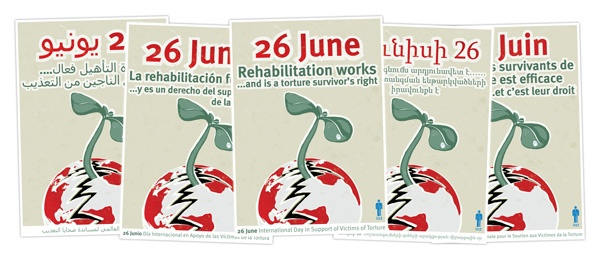“Torture is a contextual factor"
Interview by Alessandra Zocca
|
|
|

Helene de Rengervé
Head of the Brussels Office of the International Rehabilitation Council for Torture Victims (IRCT)
|
PWI – Premise - Hélène, I used to be an activist at Amnesty International for many years and I led campaigns against torture. I am very sensitive to this crime, therefore I thank you for helping torture victims recover and be able to hope again.
Hélène, please introduce IRCT (International Rehabilitation Council for Torture) to us, their mission, organisation and main activities?
IRCT
(International Rehabilitation Council for Torture) is
an umbrella organisation of 143 rehabilitation centres (members) in more than 70 countries around the world representing an international movement against torture and for victims of torture. These centres provide primarily medical, psychological care and sometimes also legal and social support to a hundred thousands of torture survivors each year.
There are a number of organisations that work on torture prevention, but IRCT is amongst the few ones who work on rehabilitation of torture victims.
Organisationally speaking the IRCT Head office (the Secretariat) is located in Copenhagen and Joost Martens recently took up his post as the new Secretary-General.
IRCT includes also two delegations, one in Brussels working towards the EU institutions here and one in Geneva towards the UN. The Brussels Office I head is in charge of four main activities: the EU-policy follow-up, advocacy and networking, the support to the IRCT members by promoting and exchanging knowledge/ best practices, and the regional coordination of 50 centers located in 26 European countries.
IRCT was founded in 1982 in Copenhagen by a woman, Dr. Inge Genefke. “… in response to Amnesty International's appeal in 1973 to the medical profession to help fight torture, Dr. Inge Genefke formed the first Amnesty International medical group in Denmark. At that time no knowledge existed about the destructive influence of torture on the victim's physical and psychological health, so the work started from scratch. The pioneering investigations of Genefke's group resulted in the establishment of more medical groups the world over. The need for treatment and rehabilitation then led to the establishment of the first rehabilitation Centre for Torture Victims in Copenhagen with Dir. Genefke as medical director” (1).
Inge Genefke inspired a film – “The Secret Life of Words”, directed by Isabel Coixet in 2005 - in which the IRCT’s founder role was played by the actress Julie Christie.
PWI - Which are the current projects, campaigns and events?
Alessandra, we are supporting our member centres in many regions but particularly these days, in the Great lakes and in Libya. I would also like to highlight the two campaigns illustrated below (2).
 |
Join IRCT for a World without Torture
IRCT has created the social media campaign World Without Torture (3) to enable citizens around the world to engage directly in combating torture and supporting torture victims.
Personal stories from torture victims, global torture fighters and those who have been touched by torture will be featured on Facebook, Twitter and on our blog, as will factual information on torture.
You can help realise the dream of a World Without Torture by getting engaged and helping us spread the word.
|
International Day
Thank you for commemorating the International Day in Support of Victims of Torture (4)
|
 |
PWI – Hélène, what inspired you to pursue your professional life in a humanitarian field? And why IRCT?
Tell us, please, about yourself and your role of Head of IRCT Brussels Office.
Since my childhood I have as always fought unfairness, Alessandra, I was born in the republic of Central Africa where my parents lived as lay missionaries, in a mission in the 60s and 70s.
I was young when I came back to Europe, but early in my professional life, I started working for a rehabilitation centre in Paris in charge of the fund raising and later on, together with Dr. Pierre Duterte (General Practitioner & psychotherapist) (5), I founded a centre for rehabilitation of torture victims, where I was heading the administration and advocacy activities.
When my husband moved to Brussels I succeeded in finding my current job at IRCT, which gives me a lot of stamina. In my role I lead three major area:
- Follow up the EU policies in the fields of anti-torture and asylum conditions
- Identify and deal with funding sources
- Support IRCT member centres in funding matters and in seeking opportunities.
PWI – What is the torture status in the world?
It’s a sad to say, Alessandra, torture (6) is nowadays practiced in over 100 countries in the world, I mean systematic torture as a means to enforce law, repress populations and extract confessions.
Even in Europe we still suffer from this social plague: we have torture cases in Belarus and Ukraine, and regular practice in Azerbaijan.
While sexual torture is perpetrated against both women and men, the traditional torture as means for repression usually affects primarily men (especially in societies dominated by men). If not tortured themselves, women and children are also very often “secondary victims”, meaning:
- Wives or children of an imprisoned man are discriminated against or rejected by their community. For example in Mauritania, while a guy was in prison and tortured, the police officers repeatedly raped his wife in front of their children to maintain the pressure, and his children were banned from school because they were sons and daughters of an opponent to the regime, who was depicted as a bad person
- Tortured men, if not rehabilitated, tend to get very irritable to noise and stress, and have problems bonding again with their loved ones and sometimes they cannot refrain from beating their wife and children, even if they remember that before the torture they never did that and thus feel guilty about it. This vicious circle will probably instill the same violent pattern in these children when they are adults
- In the worst case, torture can affect several generations. The physical and mental after-effects of torture often place great strain on the entire family and society. Children are particularly vulnerable (7). Often, the first objective of rehabilitation is to help the survivor to relieve the suffering from feelings of guilt or personal responsibility for what has happened.
Unfortunately, the rehabilitation work is also impaired by the fact that many perpetrators are not prosecuted, and in case where they are, they are convicted for extreme use of violence, a softened terminology to avoid the word “torture”. No state wants to admit the usage of torture; this is also a reason why rehabilitation centres for victims of torture are rarely supported: this would mean acknowledging its practice.
PWI – Hélène, is it not natural that we automatically feel repulsion towards torture?
Torture scares anyone, it freezes us into inaction. Despite the fact that torture is not natural, the main risk of accepting
torture is a contextual factor.
Unfortunately people who live in countries where systematic torture exists, they get trapped in the loop as torture is an entire element of their reference context. In this case campaigns against torture, the prosecution of perpetrators and rehabilitation work are essential but not sufficient, it’s necessary
to “repair” also the community and to help them reframe their context by experimenting the rule of law.
Let me make an example: some Sierra Leone child soldiers in a rehabilitation therapy in Paris were discussing the presidential election process in France and specifically the episode of Valéry Giscard d'Estaing failing to secure his re-election in 1981 and saying goodbye online. For these children it was unbelievable how d'Estaing accepted this conclusion and did not put in action any retaliation to recover his power. Their life experience was different from ours and it affected their theoretical understanding of the rule of Law. It took them to live it before they could truly integrate what we meant by this concept.
PWI -
How can such a horrible shock like torture be healed? What does rehabilitation consists of? What is the future after torture for its victims, how can they cope with life?
Rehabilitation and reintegration are difficult because once individuals have been tortured, they need to overcome serious obstacles:
- Victims struggle to believe that somebody could have inflicted pain with such evil, that they were deliberately tortured. Denying it happened or obliterating it from their memory is a form of self-protection.
- They suffer from multiple physical and psychological sequellae: body pains, headaches, anxiety, depression, etc.
- They do not have trust in others and are often reluctant to engage in relationships, it becomes complicated for them to reach intimacy, to accept kindness and they become oversensitive to noise and confusion.
- They fear that they are going insane and they might have invented everything.
I can mention the case of an Iranian guy, who was arrested and tortured for one year and then intentionally his captors released him on exactly the same day, same time and same place where he was arrested. With this technique the perpetrators wanted to confuse him: the guy was not really sure something so terrible really happened to him and he accepted the sad truth only when he got his refugee status stating he had certainly been tortured.
- In some areas of the world, like Africa, torture acts are more and more systematically associated with rape, whose impact becomes even more atrocious in the Muslim communities, because being raped is considered as a family’s disgrace. Rape victims have serious difficulties and low probabilities of being reintegrated without proper support.
Rehabilitation is necessary and the specific healing approach may vary from person to person due to their different personalities.
Rehabilitation can be summarized in rebuilding:
- Trust – Creating the ability to engage again, to believe other individuals
- Safety – Recreating the sense and the conditions of safety at physical, mental and family levels
- Hope – Awake in victims the hope for their future, in fact they cannot recover, if they don’t have perspectives of a decent life. The ones who do not achieve the feeling of hope, they are at high risk of committing suicide.
We have adopted a holistic approach towards rehabilitation, you cannot support a person to get back to their lives as before counting only on a strict medical approach: torture victims need psychological and social support, family or/and individual therapy in order to be able to reintegrate themselves in the society.
When needed, other members of the survivor’s family – in particular the spouse and children – are also offered treatment and counseling.
Doctors and psychologists/ psychiatrists with the adequate skills to relieve and heal torture victims are not easy to find and it is also for them a very difficult task to deal with.
Rehabilitation is sometimes long and difficult and its result is strongly related to external life factors such as housing, poverty, legal status, etc. but when offered, it makes a clear difference and allows survivors to rebuild their life as full as possible.
PWI -
Do you have a story that you would like to share with us about a good outcome for a group of victims of torture?
Thank God there are plenty of stories with a positive outcome. I will tell you the story of a sixteen year old child soldier going through rehabilitation in a centre in Paris, every day the child had a consultation with a doctor, but he did not say a word, just cried. It took six months before he felt able to open up, to speak and share his terrible story.
After three years the child was given the opportunity to engage in a small job (i.e. making photocopies etc.), which he accepted and after some time he asked to be trained as a documentalist. Later he got the documentalist certification, succeeded in obtaining a study grant and achieved an international business law degree in the US, where he married and currently lives happily.
PWI – Can you foresee a world in which torture will no longer take place?
My real dream would be to eliminate torture, but unfortunately it’s still utopia. I think, though, that we could achieve rehabilitation not only for the victims of torture, but also for their local communities and thus slowly reducing the tolerance for torture.
I wish also a proper justice for the perpetrators of torture, to cancel their impunity, because they are conscious that what they are doing is not excusable: tortures nowadays are scientifically developed and executed! Leaving the perpetrators free is just opening the door to more torture as much as addressing torture politically only behind closed doors.
The end of torture can only take place when we all will fight our own repulsion to it, face it and fight it publicly.
| Short Biography |
Hélène de Rengervé, Responsibilities include oversight of all IRCT activities across the Council of Europe region; liaising with European member organisations and coordination of actions & projects; monitoring EU policies (both for internal & external affairs/on political and operational grounds); advocating on the survivors’ rights to rehabilitation in Europe as well as leading fundraising efforts on behalf of European rehabilitation centres. From 2004-2010 she worked as administrative and financial director at the IRCT member centre Parcours d’Exil, which she had [H. de Rengervé] co-founded in 2001. Previous experience also includes presidency of AEGEE Europe, mission leader at WelcomEurope, project management for the Newropeans International Conference in 2000, working as trainer in Poland within the framework of the PHARE programme and a position at the rehabilitation centre AVRE, in France. BA in Trade and Management, MA in European Studies and Fundraising Diploma. Languages: French (mother tongue), English (fluent), Spanish (independent user). From January 2013 on, she will become Head of Donor Relations for IRCT
Hélène de Rengervé
Head of IRCT Brussels office & Programme Co-ordinator Europe
205 rue Belliard - 1040 Brussels
Tel: +32 2 230 15 04
Email: hdr@irct.eu
www.irct.org
International Rehabilitation Council for Torture Victims (IRCT)
Borgergade 13
P.O. Box 9049
1022 Copenhagen K
Denmark
Tel: +45 33 76 06 00
Fax: +45 33 76 05 00
www.irct.org
|
Disclaimer -
Any views and opinions presented in this article are solely those of the author and do not necessarily reflect those of IRCT, nor do they constitute a legally binding agreement.
(6 The most widely accepted
definition of torture internationally is that set out by Article 1 of the United Nations Convention Against Torture and other Cruel, Inhuman or Degrading Treatment or Punishment (UNCAT):
“...
'torture' means any act by which severe pain or suffering, whether physical or mental, is intentionally inflicted on a person for such purposes as obtaining from him or a third person information or a confession, punishing him for an act he or a third person has committed or is suspected of having committed, or intimidating or coercing him or a third person, or for any reason based on discrimination of any kind, when such pain or suffering is inflicted by or at the instigation of or with the consent or acquiescence of a public official or other person acting in an official capacity. It does not include pain or suffering arising only from, inherent in or incidental to lawful sanctions.”
From this definition, it can be said that torture is the intentional infliction of severe mental or physical pain or suffering by or with the consent of the state authorities for a specific purpose. Torture is often used to punish, to obtain information or a confession, to take revenge on a person or persons or create terror and fear within a population.
http://www.irct.org/what-is-torture/defining-torture.aspx
.png)
.png)